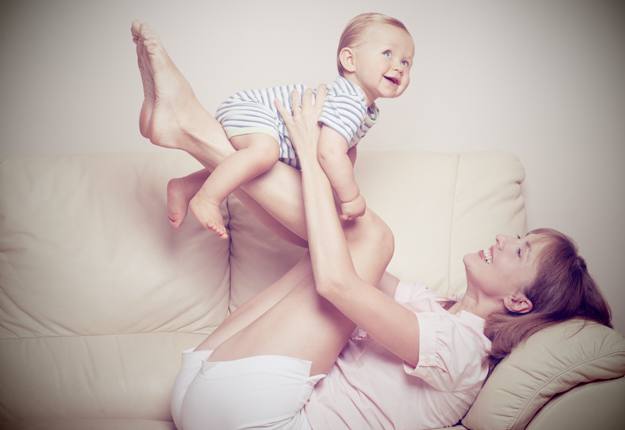Many mums and dads ask me questions like, “how do I play with my baby” and “what should I be doing with her?”. This article is about the art of play.
For some it comes naturally and for others it needs to be learnt. If you have been surrounded by family and friends with babies you will have seen their interactions with children of different ages. Some new parents however may never have interacted with a newborn or a small child.
The age of your baby impacts the activities and interactions you will be able to do with him or her. In the first 1 to 2 months your baby is spending most of their time feeding and sleeping. During nappy change most of a newbornsʼ interaction is done. Things such as stroking their legs, holding their hands, singing and talking can come naturally at this time. Babies really just need to hear the sound of your voice and it doesnʼt matter what you are saying, to them it is comforting and reassuring.
Tummy time is important from day 1. Lots of development comes from being on their tummy. Strengthening of their back and neck muscles during their initial months prepares them for crawling later on.
Around 3 to 4 months babies will begin to hold things and use their arms and legs to swipe/kick at hanging toys. This is the time rattles, soft cloth books or balls become important. As well as mobiles or play-gyms that encourage happy floor play. Talk to him or her about what you are doing, read a book or sing songs with actions like Row Row Row your boat. They love colour and movement.
Your baby is continually changing and developing and so must their activities and/or level of interaction to ensure they are stimulated and donʼt become bored. Sometimes weeks go by but the activities remain the same. Mix it up. It is important not to mistake boredom with tiredness especially in a newborn. Many parents change the game or the way they were interacting with their baby believing they were bored when in fact the baby is tired and is becoming over stimulated.
Between 4 to 8 months your baby will begin to roll or even crawl. However, this will only happen if they are placed on the floor and not held or put in a bouncer all the time. Development happens at ground level. By now they begin to reach out and hold things. They discover their feet and everything goes in the mouth! Babies of this age love faces so pop them in from of a mirror and watch them smile at “the baby”.
They love movement. Take them to the park and sit them on your lap on the swing. Sing songs, play peek-a-boo or blow bubbles. Give them toys that make a noise when they hit/kick them. You can make your own rattle with a plastic bottle and rice inside. (Just make sure the lid is on tight so they cannot choke)
Once your baby is mobile (rolling, crawling or walking) you must ensure your house is safe and bub cannot reach any hazards.
By 8 to 12 months allow your baby to explore different surfaces and environments such as crawling through sand, dirt and grass. Make tunnels out of boxes or your furniture and chase your baby around. Chase and push balls. They may also like to walk pushing a trolley or kneel while pushing a box. They move all sorts of things in their own quirky little way! Lots of singing and action songs like “Wheels on the Bus”. This was a favourite of my three children. Water play in the bath- fully supervised, is a fun way to interact with your baby.
There is no right or wrong way to play with your baby, as long as he or she is safe. Just do what feels natural and donʼt feel as though you have to buys lots of toys and all the latest gadgets. Back to basics is after all the best and allows both you and your babyʼs imagination to come alive.
Enjoy and have fun is the key.




















10:48 pm
11:31 pm
10:25 pm
10:17 am
6:21 pm
5:21 pm
5:53 pm
10:36 am
6:59 pm
10:58 pm
9:39 pm
10:05 pm
10:21 pm
12:27 am
1:33 pm
2:15 pm
3:37 pm
6:23 am
1:40 am
11:01 pm
- 1
- 2
- …
- 5
- »
Post a commentTo post a review/comment please join us or login so we can allocate your points.